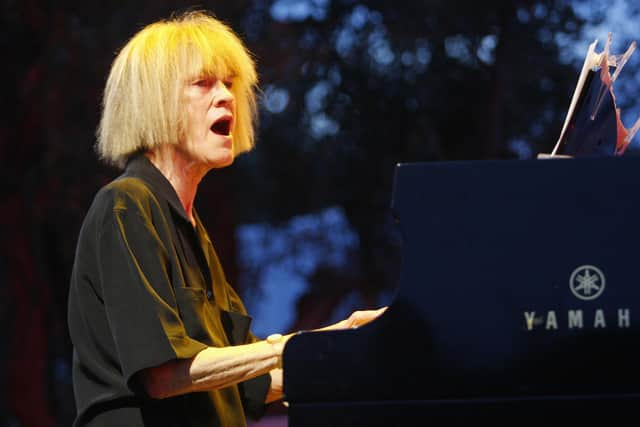Obituaries: Carla Bley, jazz composer and pianist whose eclectic career spanned seven decades
Jazz polymath Carla Bley, who has died aged 87, was fierce and blunt of fringe but fluid and flexible as a key player in late-20th century jazz. Her eclectic and prolific output, comprising around 30 albums and many more collaborations, encompassed an early association with the free jazz movement of the Sixties alongside her then-husband Paul Bley but also incursions into the maligned world of smooth jazz in the Eighties.
Describing herself as 99 per cent composer, one per cent pianist, Bley was self-taught and never followed the crowd – as enamoured by the Beatles, bluegrass and gospel as she was by her favourite pianist, Count Basie, she was no stranger to melody, minimalism and maximalism in a career spanning seven decades.
Advertisement
Hide AdAdvertisement
Hide Ad“I’m like a slow sponge,” she said. “I take in ideas from everywhere, and when I eventually find my notes, I know they’re the right ones.”


She composed gentle jazz standards Ida Lupino and Lawns and collaborated comfortably with rock musicians such as Nick Mason and Jack Bruce, but was most acclaimed for her epic jazz opera Escalator Over the Hill, which topped Melody Maker’s Album of the Year poll in 1973 and was described by Rolling Stone magazine as “an international musical encounter of the first order” and by Stylus Magazine as “the greatest album ever made”.
Bley was also a founder member of the Jazz Composers Guild, blazed a trail with a succession of artist-owned record labels, was awarded a Guggenheim Fellowship in 1972 and became a voracious touring artist with her Very Big Carla Bley Band. But her refusal to entertain easy pigeonholes meant that she was not always accorded the respect she merited. She spoke of having fruit thrown at her when she first toured Europe and reflected that “I sometimes feel I should wear a sign onstage saying She Wrote the Music.”
Bley was born Lovella May Borg in Oakland, California to Swedish parents. Her mother Arline died when Bley was eight. Her father Emil was a church organist and choirmaster. He was also a piano teacher but did not find a keen student in his daughter – by the age of five, he left her to her own musical devices, a taste of things to come.
Bley was a keen rollerskater in her teens but discovered jazz for herself when she first heard vibraphone player Lionel Hampton. She dropped out of school early, hoovered up the cool sounds of Gerry Mulligan and Chet Baker and moved to New York aged 17. She initially worked as a cigarette girl in legendary jazz club Birdland, where she witnessed shows by jazz giants Miles Davis, John Coltrane and Basie. She met and found a soulmate in Canadian pianist Paul Bley and toured with him as Karen (later Carla) Borg, taking his name as her stage moniker when they married in 1957.
He encouraged her to compose and her first successes came when other musicians, such as George Russell and Jimmy Giuffre, recorded her compositions. In 1964, as their marriage was floundering, Paul Bley recorded an entire album, Barrage, of his wife’s works with his quintet. A four-day concert festival that autumn, dubbed the October Revolution in Jazz, led to the founding of the Jazz Composers Guild by bandleader Bill Dixon and the following year Bley formed the Jazz Composers Guild Orchestra with her new husband, trumpeter Michael Mantler, offering an orchestral take on avant-garde music with soloists such as free jazz luminaries Cecil Taylor, Don Cherry and Pharoah Sanders. Ahead of their time in more ways than one, they released music on their own label JCOA, the Jazz Composers Orchestra Association, and later founded the New Music Distribution Service to give artists greater control of their output.
Bley hit a purple patch in the late Sixties, adapting A Genuine Tong Funeral for vibes player Gary Burton in1968 and contributing compositions and arrangements of Spanish Civil War songs for Charlie Haden’s Liberation Music Orchestra (when Haden died in 2014 she became bandleader).
Her own masterpiece Escalator Over the Hill was recorded over three years and released in 1971 as a triple LP. This free-ranging one hundred-minute suite, with lyrics by Paul Haines, featured a prestigious cast list, including vocalists Linda Ronstadt, Manfred Mann frontman Paul Jones, Warhol superstar Viva and Cream bassist Jack Bruce returning to his jazz roots, frequent collaborator Cherry and jazz fusion guitarist and Mahavishnu Orchestra bandleader John McLaughlin. Its unfettered blend of raga, rock, jazz and cabaret was hailed by Stylus Magazine as “literally whatever you want to make of it”.
Advertisement
Hide AdAdvertisement
Hide AdBley relocated to upstate New York in the Seventies, founded another label, WATT, and assembled her own recording studio. In 1981, she composed all the songs for Nick Mason’s Fictitious Sports, the debut solo album from Pink Floyd’s drummer, with vocals by Robert Wyatt. She separated from Mantler in 1991 and began a relationship with bassist Steve Swallow, who played in her Very Big Carla Bley Band and smaller ensemble the Lost Chords.
Later releases, infused with her offbeat humour, included 1998’s Fancy Chamber Music and Carla’s Christmas Carols in 2009. She was the recipient of the 2015 National Endowment for the Arts Jazz Masters Award and was still lost in music in her eighties, telling the New York Times in 2016 “I’m not interested in organising. I want to write the next piece.”
Bley was diagnosed with brain cancer in 2018, later saying that the operation affected her perfect pitch. Her last album, Life Goes On, was released in 2020. She is survived by Mantler, Swallow and her daughter Karen Mantler, also a jazz musician.
Obituaries
If you would like to submit an obituary (800-1000 words preferred, with jpeg image), or have a suggestion for a subject, contact [email protected]
Comments
Want to join the conversation? Please or to comment on this article.